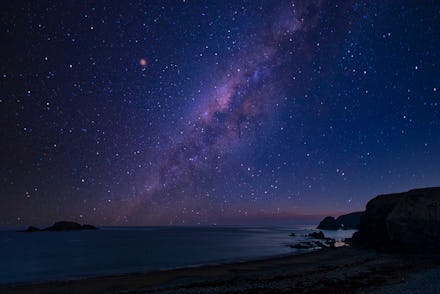Amazon wants to launch thousands of satellites into space, and astronomers are pissed

The night sky is starting to fill up with satellites. Last month, the Federal Communications Commission (FCC) gave Amazon approval for Project Kuiper, a massive constellation of satellites that the company plans to launch into space with the intention of creating a network that can beam down high-speed internet service to millions of people in rural and underserved areas. While the goal of the project seems useful, the New York Times reports that astronomers and scientists are pissed that the influx of new satellites in orbit will make it harder to study the sky.
Amazon's Project Kuiper, which the company says will eventually consist of 3,236 satellites, is the latest high-tech constellation to get approval, but it is far from the only one. The FCC has given the go-ahead to a number of competing internet satellite companies, all of which intend to launch thousands of small satellites into low earth orbit to provide internet to those grounded to Earth's surface. Back in 2018, the FCC gave SpaceX the go-ahead to start on its Starlink constellation with permission to launch as many as 12,000 satellites. So far, it has deployed about 600. The year prior, the FCC approved a similar network from startup OneWeb. The company, which was recently sold, has thus far only launched 74 of a planned 648 satellites but has asked for permission to eventually operate 48,000. Others, including Facebook, are expected to join this race to create sky-bound internet networks.
All of those satellites could dramatically change the view of the sky as we know it. There are currently about 2,600 satellites orbiting the earth, according to a database maintained by the Union of Concerned Scientists. That will increase exponentially as these new networks come online. While the satellites themselves are not large, they leave their mark on the sky. The satellites reflect sunlight, often creating a glare that to astronomers and other skywatchers looks like a smudge on an otherwise pristine picture. Last month, SpaceX came under fire when its satellites interrupted the view of the Comet NEOWISE. Last year, astronomers raised concern over the satellites after a train of them passed overhead during an observation period and effectively ruined the data collection process. Observers of the sky have pointed out that when these satellites reflect light, it is often distractingly bright. According to a report from Spaceweather.com, SpaceX crafts, in particular, have been known to create light flares that are as much as 50 percent brighter than Sirius, the brightest star in the sky.
It's not just our view of the sky that is being interfered with, either. Radio astronomers have warned that satellite networks interfere with radio frequencies used for deep space observation. Radio astronomers were able to capture the first-ever image of a black hole. The same technology that was used to take that picture has dealt with disruptions caused by radio chatter produced by OneWeb's satellites.
While these existing satellite constellations cause problems for those who watch the sky for a living, Amazon's approval marks a new threat. “Kuiper would easily have as much of an impact on both optical and radio astronomy as other satellite constellations,” Jeff Hall, the director of the Lowell Observatory in Arizona and the chair of the American Astronomical Society’s Committee on Light Pollution, told the New York Times.
With no rules in place to regulate these satellites or how they operate, much has just been left up to the companies to ensure they don't interfere with the tools that help us understand the universe. SpaceX has agreed to paint its satellites black to try to cut down on light reflection, though astronomers aren't convinced it'll make much of a difference. Amazon is reportedly working with astronomers to address their concerns. Mic reached out for more information about what the company is doing to address issues raised by astronomers but did not receive a response. Astronomers would prefer to establish rules that will help keep the skies clear without having to seek accommodations. Without those rules, space — and its mysteries — might suddenly seem even farther away.